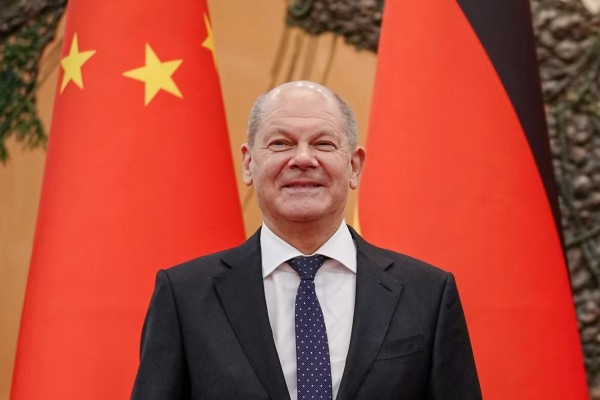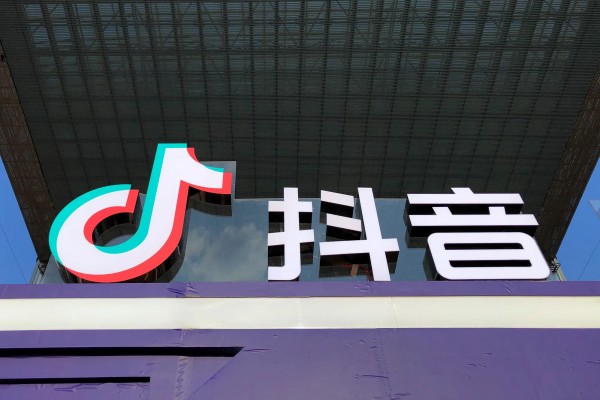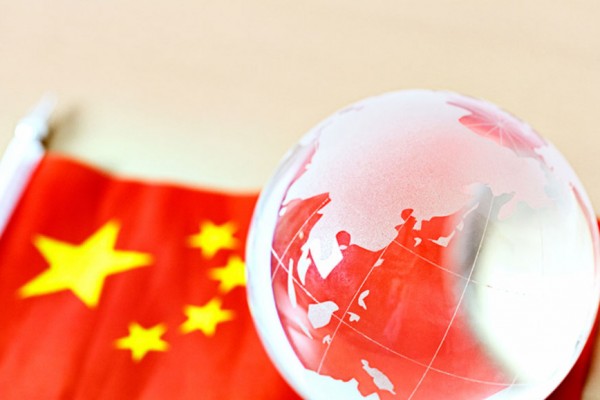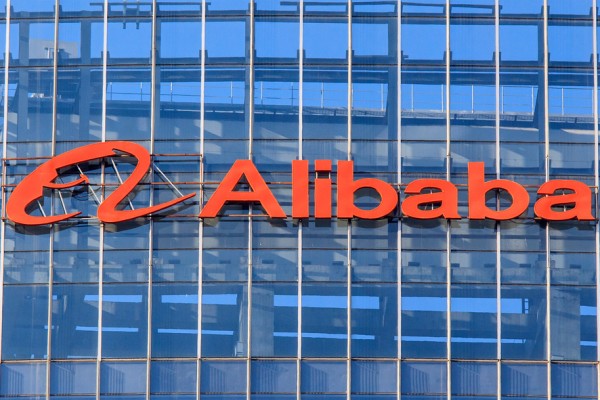Review No. 36 of Chinese Antitrust News from the Experts of the BRICS Competition Centre
- Fair Competition Policy Publicity Week
- Draft amendments to the Law "On Combating Unfair Competition"
- Signal of support for IT-giants
- State Council report on the development of digital economy
- PCAOB gets full access to audits of Chinese firms for the first time
- Bill to ban TikTok passed in the U.S.
- More market-oriented business environment for foreign companies
- Zhejiang provincial party secretary visits Alibaba
- China promotes inspections of semiconductor manufacturers
- 20 measures to build data systems
- How market stability is protected amid weakening anti-epidemic measures
- 24th EU-China Competition Policy Week
- Deepfake regulation rules
- Appendix: Antitrust regulation in diagrams
Fair Competition Policy Publicity Week
From November 14 to 18, China held its first Fair Competition Publicity Week. All of the activities of the Week focused on the theme "The Great Single Market. Fair Competition of Future": a total of about 200 different activities took place, both at the government level and on the ground. Among other things, the 9th China International Forum on Fair Competition Policy was timed to coincide with the week. At the forum, officials from competition authorities and other government agencies from China and around the world addressed the measures being taken to stimulate fair competition and legislative innovations. Alexey Ivanov, Director of the BRICS Competition Centre, spoke on a panel on "Fair Competition Policy for Creating a Single Market." He emphasized that the competition policy was developed in the conditions essentially similar to those of today: in the times of changes, conflicts, and economic and social instability. At that time, it helped to meet the challenges of the times, but then it was gradually pushed out of the antitrust discourse, and competition authorities are now faced with the task of putting the notion of "fairness" back on the agenda.
The BRICS Coordinating Committee on Antimonopoly Policy also met during the Fair Competition Publicity Week and was attended by representatives of the BRICS competition authorities: Ms. Gan Lin, Deputy Head of the State General Administration for Market Regulation (SAMR) of China, and Ms. Doris Tshepe, Commissioner of the Competition Commission of South Africa, Victor Fernandes, Commissioner of the Brazilian Administrative Council for Economic Defence (CADE), Maxim Shaskolsky, Head of the Russian Federal Antimonopoly Service and Dr Sangeeta Verma, Acting Chairperson of the Competition Commission of India. At the end of the meeting Sangeeta Verma on behalf of the Competition Commission of India presented a promo video of the upcoming VIII International Competition Conference under the aegis of BRICS, which will focus on "New Issues in Competition Law and Policy: Damages, Prospects, Challenges". The conference will be held on October 11-13, 2023 in New Delhi.
Sources: SAMR, SAMR, BRICS Competition Centre, BRICS Competition Centre
Draft amendments to the the law "On Combating Unfair Competition"
SAMR has published for public consultation a draft of a new version of the law "On Combating Unfair Competition". The law was passed in 1993 and has been edited twice since then: in 2017 and 2019. A significant part of the amendments touched on the digital economy: in particular, new articles were added on the prohibition of the use of data, algorithms, platform rules and technical means to carry out unfair competitive practices. It is also proposed to toughen liability for violations: for example, to increase the upper threshold of the fine for unfair competition on the Internet from 3 to 5 million Chinese yuan, and the obligation to pay compensation - up to five times the amount calculated on the basis of actual damage (in the presence of aggravating circumstances). A comparative table of the current and proposed versions of the law in Russian can be found on the BRICS Antimonopoly Center's website.
Signal of support for IT-giants
On December 15-16, the Central Economic Activity Meeting was held in Beijing: representatives of the central authorities summed up the economic results of 2022 and outlined the main areas of work for 2023. One of these directions was to strengthen the development of the digital economy, improve the quality of "normalized" regulation (i.e. that has become the norm rather than seen as an exceptional measure), support platform companies to fully realize their flagship development role, their ability to stimulate employment, and China's competitive potential in the international arena. Such a statement was seen as a symbolic shift from pressure on the Chinese Internet giants to full support for them, since two years ago a similar meeting demanded that "disorderly expansion of capital" be discouraged - a thesis that then marked the beginning of a major campaign to streamline the activities of digital giants.
The course to support "digital" also confirms the "Strategic Plan for Domestic Demand Expansion 2022-2035," which was published a little earlier. One of the points of the plan is to accelerate the formation of a new type of consumption: this implies the integration of offline and online formats in traditional industries, in-depth development of smart sales, smart tourism and smart sports, encouragement of openness of platform resources and the effective use of unused capacities.
Nevertheless, in comments to the South China Morning Post, some experts call this course of support "too abstract" - for confidence in the growth of technology giants, we need to wait for more concrete steps.
Sources: Baijiahao, Cpcnews.cn, SCMP
State Council report on the development of digital economy
The State Council of the People's Republic of China has published a report on the state of development of the digital economy. The document notes notable successes in the development of the industry: the cross-border expansion of digital infrastructure, the accelerated growth of innovative capacities, the digitalization of industry, and the strengthening of regulation of the digital sector. In terms of further work, the antimonopoly regulation of “numbers” is also mentioned, namely, the development of more detailed standards for antitrust enforcement. It is also planned to strengthen the provision of social guarantees for new forms of employment.
Source: NPC.gov.cn
PCAOB gets full access to Chinese reporting for the first time
The Public Company Accounting Oversight Board (PCAOB) confirmed that it was able to gain full access to the audit documents of Chinese companies whose shares are traded on US exchanges. The review is being conducted as part of ensuring compliance with the 2020 Foreign Companies Liability Act (HFCAA). Under this document, companies that want to be listed on US exchanges are required to provide full access to their financial statements, but until recently, China, citing national security concerns, refused to comply with this requirement. In September, the parties nevertheless came to an agreement, and representatives of the PCAOB visited Hong Kong to check the relevant audit companies. According to Board Chair Erica Williams, by adopting the HFCAA, "Congress has made it clear that access to the US capital markets is not a right, but a privilege, and China has cleared that unequivocal message." Reportedly, the fact of obtaining full access does not yet indicate the compliance of Chinese companies, but the Board confirms that during the inspections, the Chinese authorities did not create any obstacles for the inspectors. A conclusion on the detected violations will follow later - it is emphasized that its purpose is to identify potential problems and work together to eliminate them.
Source: pcaobus.org
Bill to ban TikTok passed in the U.S.
Senator Marco Rubio, backed by Republicans (Mike Gallagher) and Democrats (Raja Krishnamurthy), proposed a bill titled "An Act to Prevent the National Threat of Internet Surveillance, Coercive Censorship and Influence, and Algorithm Learning by the Chinese Communist Party." The purpose of the bill is to protect Americans from foreign attackers who use social networks to conduct surveillance, collect sensitive data, conduct propaganda campaigns and exercise censorship. The legislators are proposing to block and prohibit all transactions with social media companies that are established in countries of concern, or operate under their laws, are influenced by such countries, use software controlled by them or banned by them for export. Countries of concern include China, Russia, Iran, North Korea, Cuba and Venezuela. Only Bytedance and its short video platform TikTok are named in the text of the bill.
Similar sanctions have already been targeted on TikTok (as well as WeChat) by order of Donald Trump, but were subsequently lifted by the Biden administration - a wider range of companies may fall under the new bill.
Note that Chinese officials regularly protest the United States' tendency to politicize security issues and apply sanctions, which often affects international production and supply chains.
However, the issue of access by TikTok employees to user data has long been a widespread concern in the United States. A provision to ban the use of TikTok on the work devices of U.S. officials has already been included in the U.S. fiscal year 2023 budget bill. For its part, TikTok denies ties with the Chinese authorities and is trying to “distance itself” from the Chinese founding company, ByteDance Ltd: the latest measures include the transfer of key management employees outside of China and the search for labor resources, including engineers, in other countries, as well as dismissal employees who have access to personal data of journalists.
Sources: The Hill, WSJ, Reuters, WSJ
More market-oriented business environment for foreign companies
China will provide foreign companies with a more market-oriented, internationalized business environment based on the rule of law, and will remain a promising investment destination for enterprises from Germany, Australia and other countries, Foreign Ministry spokesman Wang Wenbin said. Thus, he commented on the results of a survey of national businesses conducted by the German and Australian Chambers of Commerce in China: the majority of respondents positively assessed market opportunities and profit prospects in China. Wang Wenbin also reaffirmed China's commitment to the basic course of opening up to the outside world and the country's desire to contribute to building an open world economy.
Source: People's Daily
Zhejiang provincial party secretary visits Alibaba
Zhejiang Provincial Party Secretary Yi Lianhong visited key companies, innovation centers and cultural locations in the provincial capital, Hangzhou. During the visit, he emphasized that the city should raise its international profile and showcase the possibilities of Chinese-style modernization.
During the visit, Yi Lianhong visited the headquarters of the Internet giant Alibaba. He repeated to the company representatives the message previously addressed to all Internet companies at the Central Economic Work Meeting: to realize their full potential in promoting development, international competition and improving the welfare of society. The Party Secretary also urged Alibaba to become an "excellent student" of regulated development, a "leader" of innovative development, and a "basic service provider" for the development of economic circulation. As noted in the South China Morning Post, Yi Lianhong became the first high-ranking official to visit Alibaba since the antitrust investigation against it began in December 2020.
China promotes inspections of semiconductor manufacturers
According to Bloomberg, China has begun working with the United States on inspections of Chinese semiconductor manufacturers. Previously, the Bureau of Industry and Security (BIS) of the US Department of Commerce included 31 companies on the Unverified List: they must prove that their products do not go to the military, otherwise they will be moved to the trade black list ( US Entity List), which prohibits doing business with businesses located in the United States or using American technology. Currently, China's Ministry of Commerce is helping Chinese manufacturers pass US end-user screenings, raising hopes of easing the tensions in the two countries' technology confrontation. According to the South China Morning Post, BIS chief Alan Estevez noted that the US is seeing "improvements in the behavior" of Chinese companies. The report says that the Bureau did not add an additional 128 enterprises to the list of "unverified" enterprises.
20 measures to build data systems
China has published a list of 20 measures to build basic data systems to better realize the role of data as a factor of production. The new measures will increase market access for both Chinese and foreign players, as well as lay the groundwork for transparent rules aimed at spurring the growth of the data industry while guaranteeing data security. The formation of data systems covering four aspects is envisaged: ownership of data, circulation and trade, distribution of income, and data security management. The measures also address issues of data processing, their cross-border circulation, foreign mergers and acquisitions that may affect national security. As Wang Peng, a research fellow at the Beijing Academy of Social Sciences, comments, the Internet and the digital economy are themselves an open common platform. Subject to the principles of security, legality and accountability, China is ready to open up and share data with friendly countries around the world.
Source: Global Times
How market stability is protected amid weakening anti-epidemic measures
In November and December, China successively eased coronavirus-related restrictions, resulting in a temporary rise in cases. In the face of increased demand for medical supplies and essential goods, SAMR issued a notice to Internet platforms, which identified eight of their key responsibilities:
- Effectively manage suppliers of goods and services on the platform (check licenses, monitor the fulfillment of obligations, the relevance of information and compliance with the rules, etc.);
- Guarantee the reliability of supply;
- Ensure price stability;
- Control food safety and product quality;
- Protect the rights and interests of consumers;
- Timely resolve emerging disputes;
- Provide decent working conditions for couriers;
- Assist the authorities in the implementation of joint management.
Separate instructions were given to manufacturers of relevant goods - the authorities indicated nine prohibited practices: do not violate the principles of honesty, integrity and fairness; not violate the requirements for a clear indication of prices; do not inflate prices; do not engage in price collusion; not engage in price fraud; not set discriminatory prices; do not engage in false commercial propaganda; do not sell goods under a foreign brand and do not imitate other people's brands; do not undermine the commercial reputation.
24th EU-China Competition Policy Week
The 24th China-Europe Competition Policy Week was held online from December 12th to 16th. Law enforcement officers from China and the EU discussed updates in competition law, antitrust measures, innovations, consideration of M&A transactions, as well as state support measures. The participants expressed their intention to deepen interaction and cooperation in the field of competition law, develop lawmaking and law enforcement, protect fair competition in the market, and promote the healthy and sustainable development of Sino-European trade and economic relations.
Source: SAMR
Deepfake regulation rules
China has published regulation rules for deep fusion technology, which will come into force on January 10th, 2023, their important task is to protect national security and public interest, and promote socialist values. It is noted that, along with the opportunities, these technologies pose new challenges to society: the dissemination of illegal or harmful information, violation of the honor and dignity of others, "identity theft", etc. The rules determine the direction of the sector's development, the goals and limits of application of deep synthesis technologies. It establishes the obligation to add a designation to the content created with their help, including a clearly visible marking for a completely synthesized or significantly modified voice, faces and environment, and when reposting informational messages, to preserve information about the original source. Deep synthesis service providers capable of influencing a wide audience need to be registered - a similar requirement applies to algorithmic recommendation service providers. At the same time, socially significant products, applications and functions must undergo security checks before entering the market.
Source: Cac.gov.cn
Appendix: Antitrust regulation in diagrams
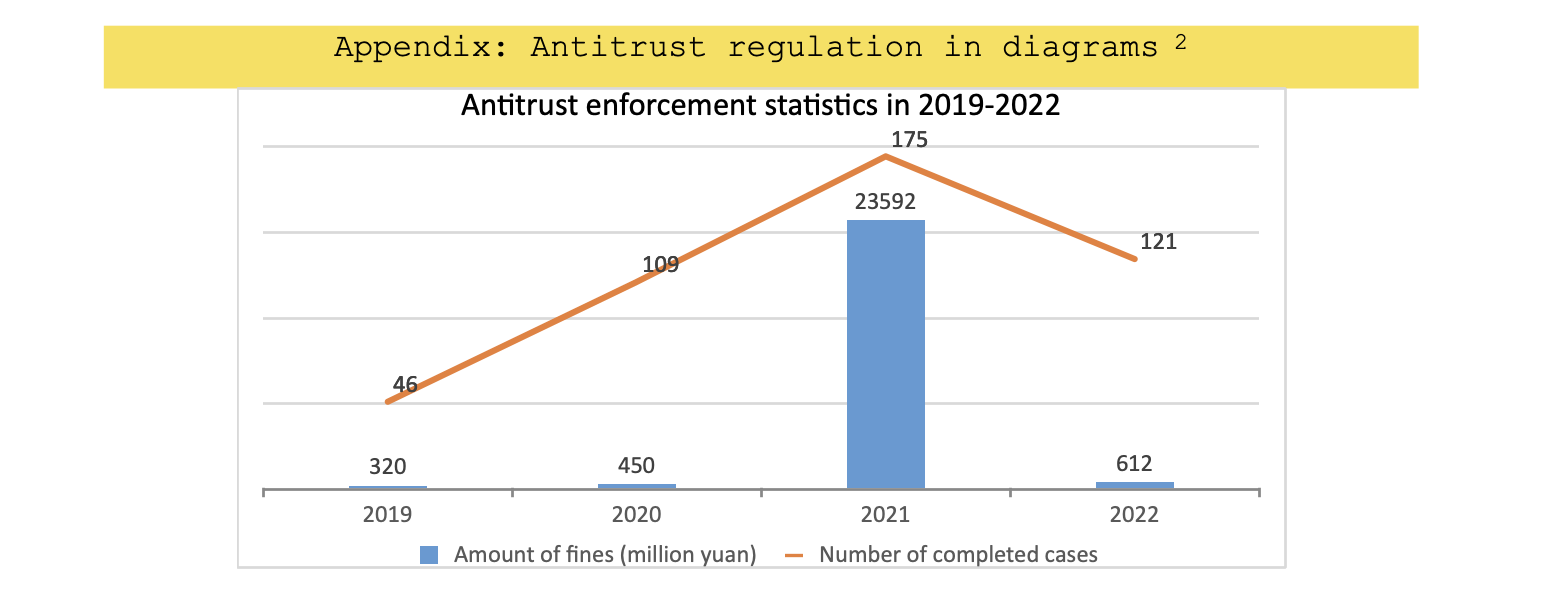
Data on antitrust cases (total number of cases across all sectors of the economy):
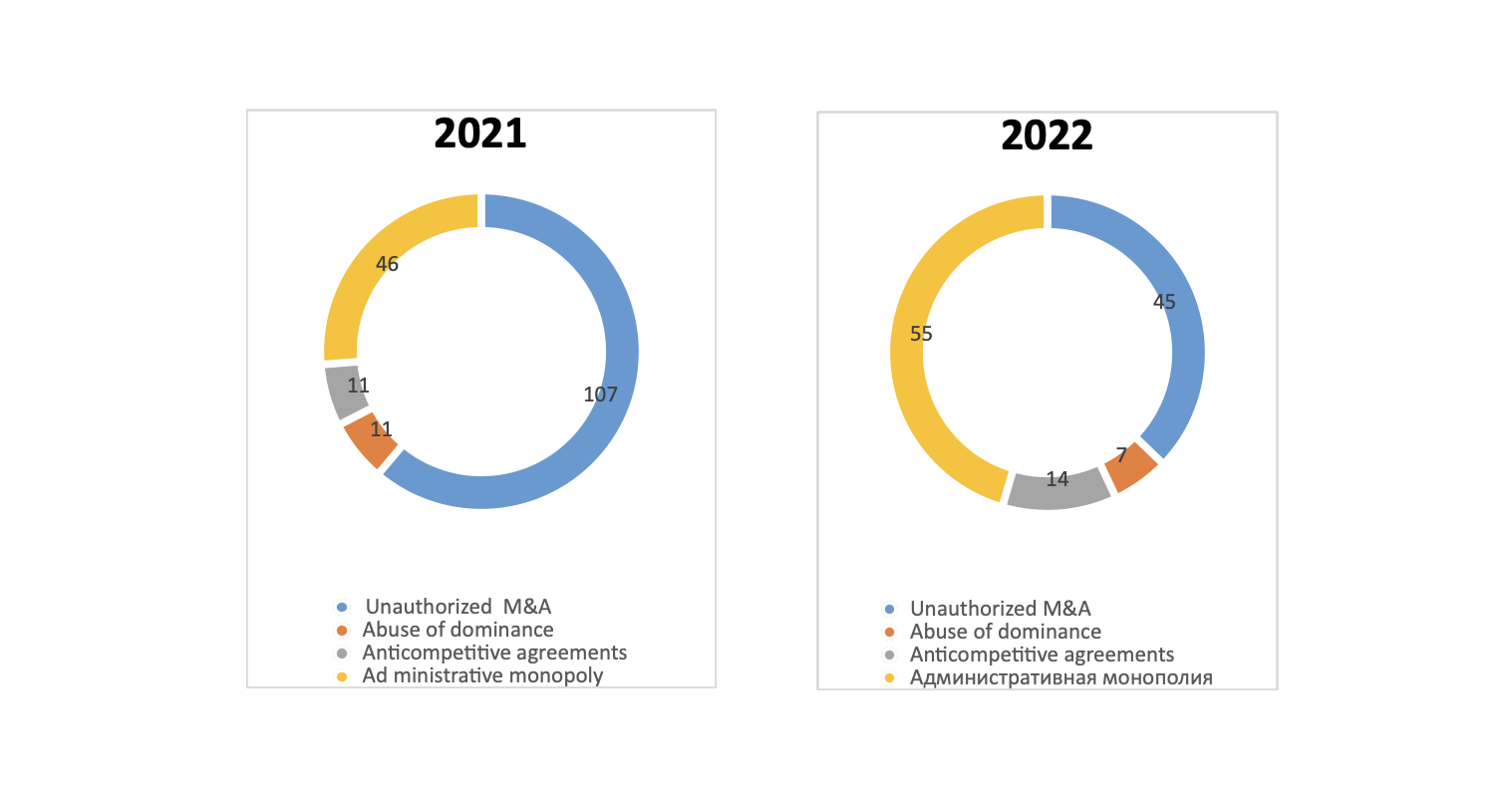
* Administrative monopoly is the abuse by administrative bodies of their official powers to the detriment of competition.
Source: Report of the portal Southern Metropolis: Antitrust Frontier "Overview of Antitrust Enforcement in the Digital Economy 2022"

